THE VENETIAN REPUBLIC: FROM RESISTANCE TO BITCOINS
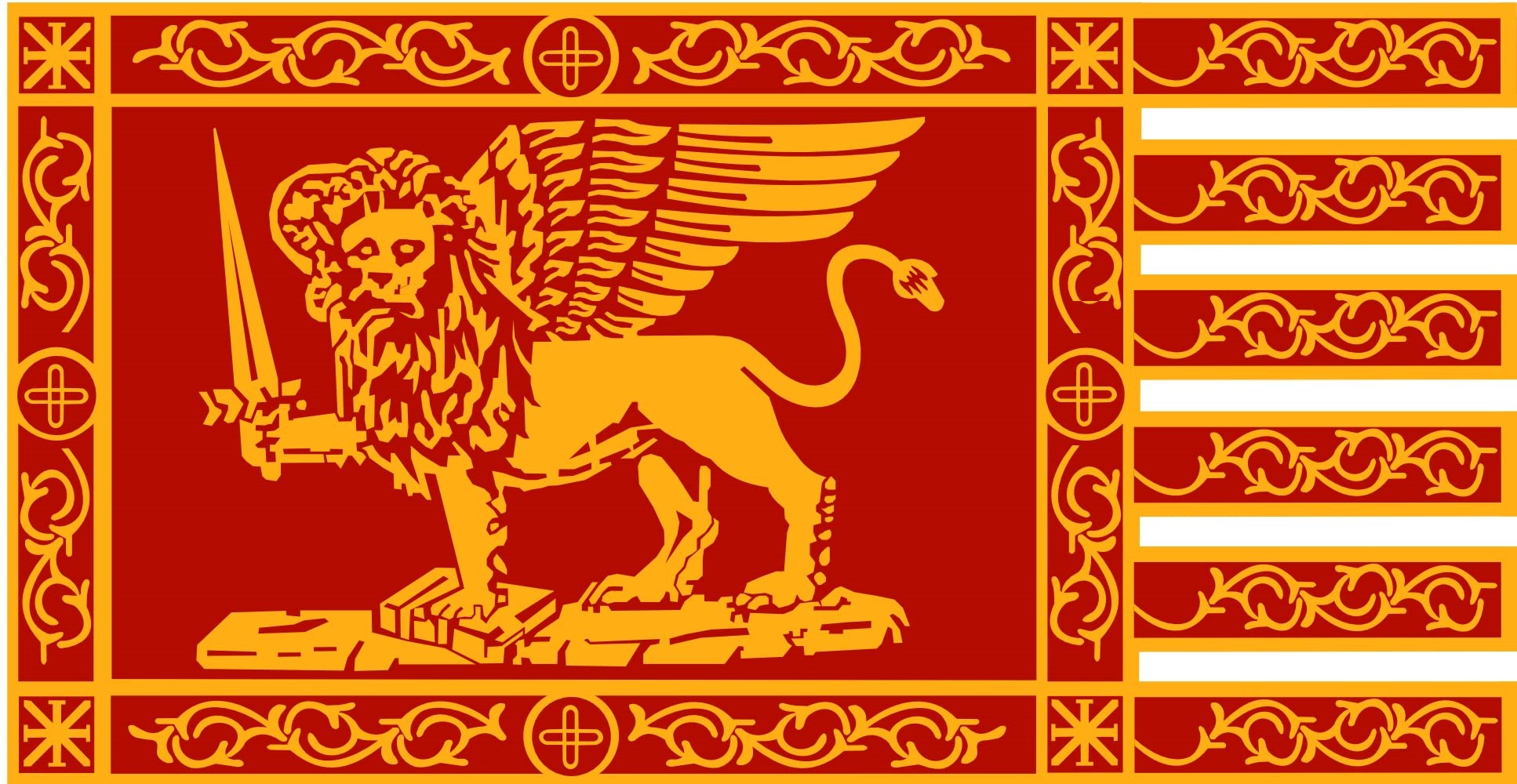
Separatist drives, within the European Union, even the most extreme, are a feature of this new century. There are not only Scotland, Euskadi (the Basque Country), the explosion of the former Yugoslavia (which with the division between Bosnia and Montenegro has lived through yet another tormented chapter), the Faeroe Islands, part of eastern Germany, Flanders, Corsica and Catalonia. Even on the Italian territory, apart from the historical South Tyrolean (Bolzano) instances, there is now a growing movement that goes back to the Most Serene Republic of Venice – one of the great international political, economic and military powers until the Napoleonic wave.
All these instances take new life from the anger of the population, and not only that opposed to the progressive unification of Europe, from the disappointment at the growing economic and social difficulties, but also from the new possibilities provided by the transfer to the internet of a whole series of operations that, previously was previously carried out by human hands – not only the bureaucracy, which now needs very few employees, but also the economy, because the emergence of cryptocurrencies and the progressive transfer of payments from paper to electronic makes possible projects that, until a few years ago, were unimaginable – such as that of the restoration of the Republic of Venice.
The newspapers snub it, including strangely enough the local papers, but under the ashes a small fire continues to smoulder. Which, as always in these cases, considered from the outside folklore can also turn into a fire, given also the not very good Italian and European situation that lends itself to unpredictable developments.
The Venetian Republic is a body that has nothing to do with leghism, that is, neither with Salvini’s Lega nor with the Liga Veneta. Instead, it was born seven years ago, in 2016, as the self-appointed heir to the glorious republic also known as Serenissima. Capital Venice. Thousand-year history and territories in Italy as far as Bergamo. And outside Italy beyond the Adriatic. The rich and powerful Venetian Republic was led by the figure of the doge and the assembly of the Maggior Consiglio. Composed of 1,200 patricians and the highest political body of the Republic. The decisions of the Great Council required a quorum of at least 600 to be valid.
The current Great Council, self-appointed in 2016 and composed of 120 people (one tenth of the 1200 in the Golden Age), appointed on 22 October of the same year 2016 as doge – to be precise, the 121st (in Roman numerals CXXI) – the highly cultured Venetian Albert Gardin[1] , former director of the Venetian Editoria Universitaria. The most recent initiative of the doge and his Venetian Republic even envisages the creation of its own cryptocurrency, or digital currency as you like to call it, following the example of Bitcoin, to be called Zecchino. That is, to be called by the name of the strong currency that was once the Serenissima’s. It is therefore certainly worth interviewing Gardin on the basis of this ambitious innovation.
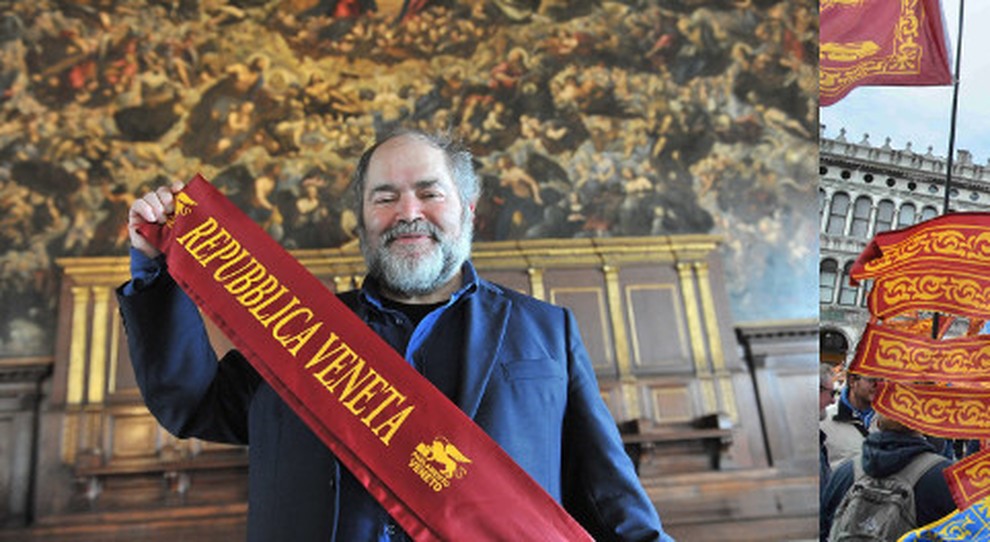
Albert Gardin, 121st Doge of Venice[2]
QUESTION: Your most recent initiative concerns the creation of a virtual currency of the Venetian Republic. What exactly does it mean, how do you plan to create it, and, finally, how do you plan to use it? For what kind of trade and with whom?
ANSWER – It goes without saying that an independent state has an independent portfolio that is not controlled by foreign or foreign offices. Currency is the real strength of a state. To re-establish our monetary independence, we need to regulate our relations with the occupying state, exit the Euro and resume issuing the Zecchino, the prestigious currency of the Serenissima. A decisive path on the Venetian treasury held by the Bank of Italy and the issuance of the Zecchino has been proposed to us by the French monetarist, Philippe Simmonot.
Q – You are also involved in a legal action against the chief magistrate of Padua for a ban on demonstrations and a ban on you being allowed to set foot in Padua for a certain period. What period, exactly, and why did this ban come about?
A – The issuing of a ‘foglio di via’ from the municipality of Padua to 10 Veneto patriots (DASPO of two years to the undersigned and one year to the other nine) by the Questore for our holding an independent trial against judicial crimes, a trial that took place in the churchyard of St. Anthony’s Basilica, was so excessive and disproportionate that it is legitimate to think that it is a provision ordered directly from Rome, in the hope of silencing us. The measure is reminiscent in spirit of the border measures against anti-fascists issued by Fascism in 1926. The Questore, promoted to a new and higher post, has thus thought of crushing our revolt against the endless ocean of judicial crimes shamelessly churned out by the regime.
Q – Can you give a history of how it came to the breaking point of wanting to prosecute the Quaestor of Padua? What are the individual points of contention?
A – The facts are these. We reacted[3] to the arrest of a lawyer from Pordenone, known for his judicial battles, considering his incarceration to be an attack on basic judicial rules, a political scandal, passed over in total political and media silence! We denounced the situation with a daily leafleting for a month in front of the Court of Padua, which had become competent on the case, where we proposed an independent judicial trial on the case. In fact, on 21 January 2023, on the parvis of the Basilica del Santo, a pontifical territory following the Concordat between the Holy See and Italy in 1929, we gathered in the trial court to address the complex situation from all points of view.
On the Sagrato we were awaited by the Digos and uniformed police. We were notified of a prescription by the Questore of Padua, Antonio Sbordone (now promoted to Bologna), to hold our ‘demonstration’ (it was not a demonstration!) ‘outside the churchyard’. We did not take the prescription into consideration because: it was not a demonstration, but a private gathering, restricted to the 20 summoned by the Tortora Court, with an ‘Antonian’ background and moreover in territory outside the jurisdiction of the Padua Police Headquarters. Our refusal led to the issue of a ‘foglio di via’ (travel warrant) from the city of Padua. We denounced the Questore for abuse of office and assault on civil and political rights. To our astonishment, the Public Prosecutor’s Office, without investigating the facts, asked for the complaint to be filed, which was granted by the Judge for Preliminary Investigations who rejected our opposition to the filing. We were faced with a judicial office that denies, that illegally seizes a trial for very serious facts!
The trial will therefore be resumed by an independent Court of Tortora at the Palace of Justice of Padua or in another judicial setting if the space of the Court of Padua is denied to us. We must support our action, otherwise we would helplessly witness yet another victory of judicial subversion. Civil revolution is also this: asserting the force of reason and law!
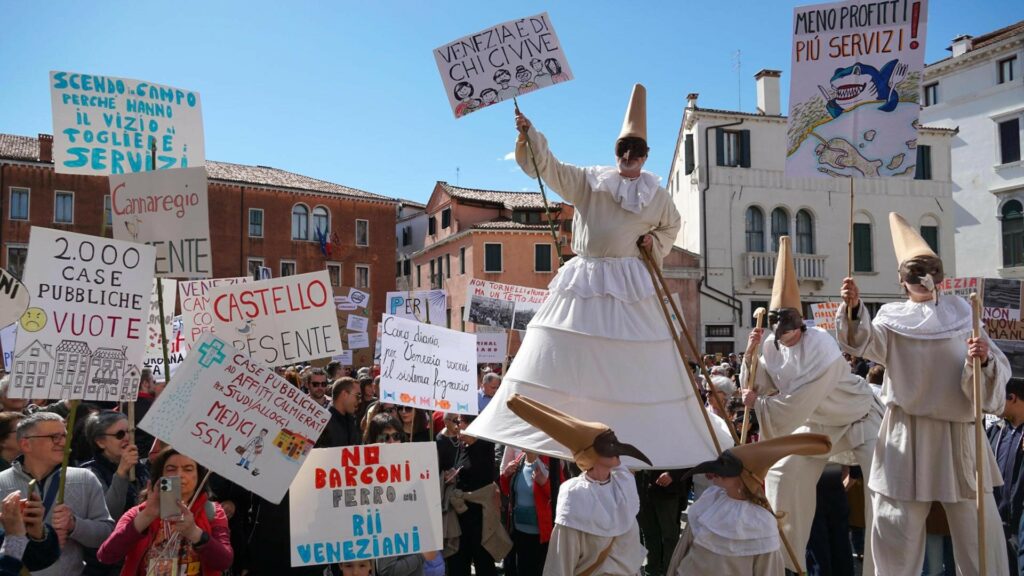
21 January 2023: protest demonstration by the Venetian people[4]
Q – You asked to be able to hold the trial in a courtroom in Padua. Do you really think they could grant it to you?
A – We civilly pose the question, to those responsible to answer in a democratic way or in a bureaucratic way. We will judge them by the facts!
Q – You would like to conduct the action with your tribunal to which you have given the name of Tortora. How did that tribunal come about, who are its magistrates and how were they chosen?
A – The ‘Enzo Tortora’ Tribunal is a democratic and free organisation, made up of civil-rights-minded personalities, which is activated to judge crimes committed by Italian courts.
Q – How did relations go with the French authorities who a few years ago seemed to want to enter into dialogue with you since the Treaty of Campoformio, which Napoleon wanted and which put an end to the Venetian Republic by dividing its territories between France and Austria? What were the issues on the table? Were they addressed? When, where and how?
A – France remains a ‘rogue country’, a country that does not recognise its political and military crimes. At the end of the Second World War, Paris demanded a Peace Treaty with Germany for the reparation of war damages and spoliation committed by German troops during the occupation of France. We demand the same from France, which continues to pretend not to hear! It is a public scandal that the Louvre is full of Venetian as well as Italian works of art, stolen at gunpoint by French troops. A scandal that must end!
Q – Over the years, you have also ventilated relations with other states, European and non-European. With which ones and for each of them for what reasons? Have you then managed to create concrete and stable, let’s say institutional, relations with any states? If so, with which ones?
A – We are active on many fronts, but international policies are subject to imperialist, colonial rules. States move with great caution towards us so as not to run into international vetoes or sanctions. Recognising the Venetian Republic would have a destabilising effect on the entire international political framework!
Q – You were appointed 121st doge of the Venetian Republic by the members of the alleged Grand Council. How many are there and who appointed the members of the Grand Council?
A – The representative institutions of the Venetian Republic were established over a period of several decades. The very taking of the Campanile in 1997, by the 8 ‘Serenissimi’, is part of this process. In 2010 we made things clear: we are not secessionists with respect to Italy (occupying country), but resistant to the Venetian Republic. The Maggior Consiglio is a parliament, not made up of elected or voted delegates, but of voluntary patriots, as was the Maggior Consiglio of the Serenissima. In 2016, the Maggior Consiglio elected the 121st doge as a sign of legal and political continuity of the Venetian Republic, which we Venetians consider always alive, albeit provisionally and illicitly occupied.
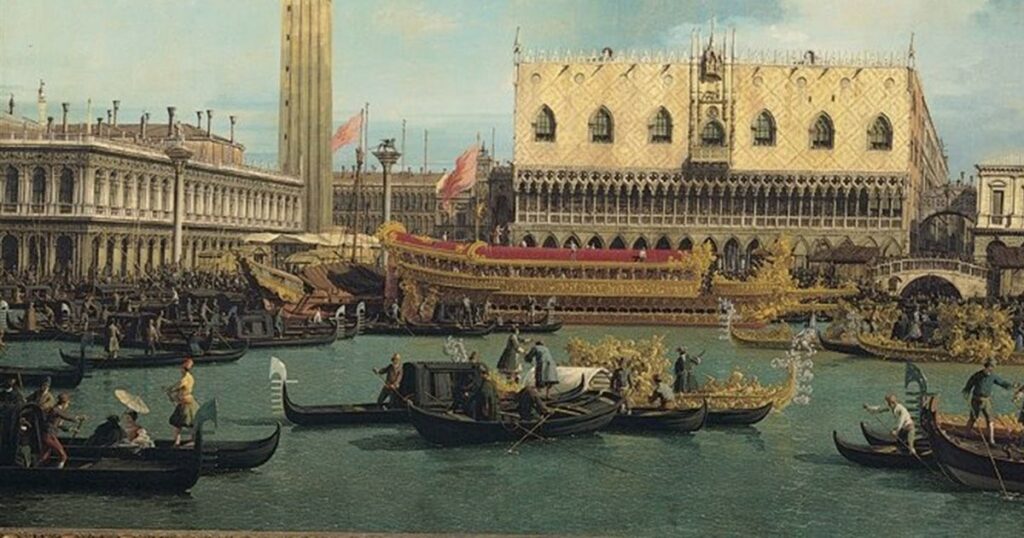
Canaletto’s painting ‘The Bucintoro at the Pier on Ascension Day[5]
Q – How does the organisational life of the Grand Council take place and in which locations?
A – Under foreign domination, we necessarily operate ‘in the bush’, with no fixed headquarters, no organised offices, but we maintain close and constant relations with each other, aided by technology that allows us to conduct most of our meetings by videoconference.
Q – Do you have your own newspaper and other mass media?
A – We have no newspapers to support our cause. Despite the fact that we are very active in communication, censorship counteracts our communiqués with a strict and shameless curtain of silence. We disseminate news via the sites serenissima.news[6] and repubblicaveneta.net[7] .
Q – In what language do you speak in institutional offices and tasks: Italian or Veneto?
A – As in the past, we speak in Venetian in internal and private relations, but since 1525 we have practised the proposal by Pietro Bembo (‘Prose della Volgar Lingua’) to use the Tuscan language in official communications. In the Maggior Consiglio it was normal to speak Venetian, but documents were transcribed in Tuscan, the official language recognised by the Serenissima.
Q – If you speak Veneto, in what language do you plan to communicate with representatives of foreign states?
A – For international communications we use Tuscan or other languages suggested by chance. The Veneto language remains our precious identity heritage. Venetian is a language: I remind you that our Giacomo Casanova translated Homer’s Iliad[8] into Venetian, which has remained unpublished. He translated it and sent it to the doge of the time to make up for his escape from the Venetian prison known as Piombi.
Q – I know that. And I know that you yourself recovered the text and had it published after presenting it in New York in 1997. Then six months ago at a private party in a town near Verona you also recited a part of it, the one concerning the famous “Wrath of Achilles”[9] . Any organisation has costs, certainly yours too since you also seek international relations, with other states. How are these costs covered? Is there a budget?
A – We do not yet possess a classic state organisational apparatus, so our financial organisation is still provisional. We always avoid unnecessary and wasteful expenditure.
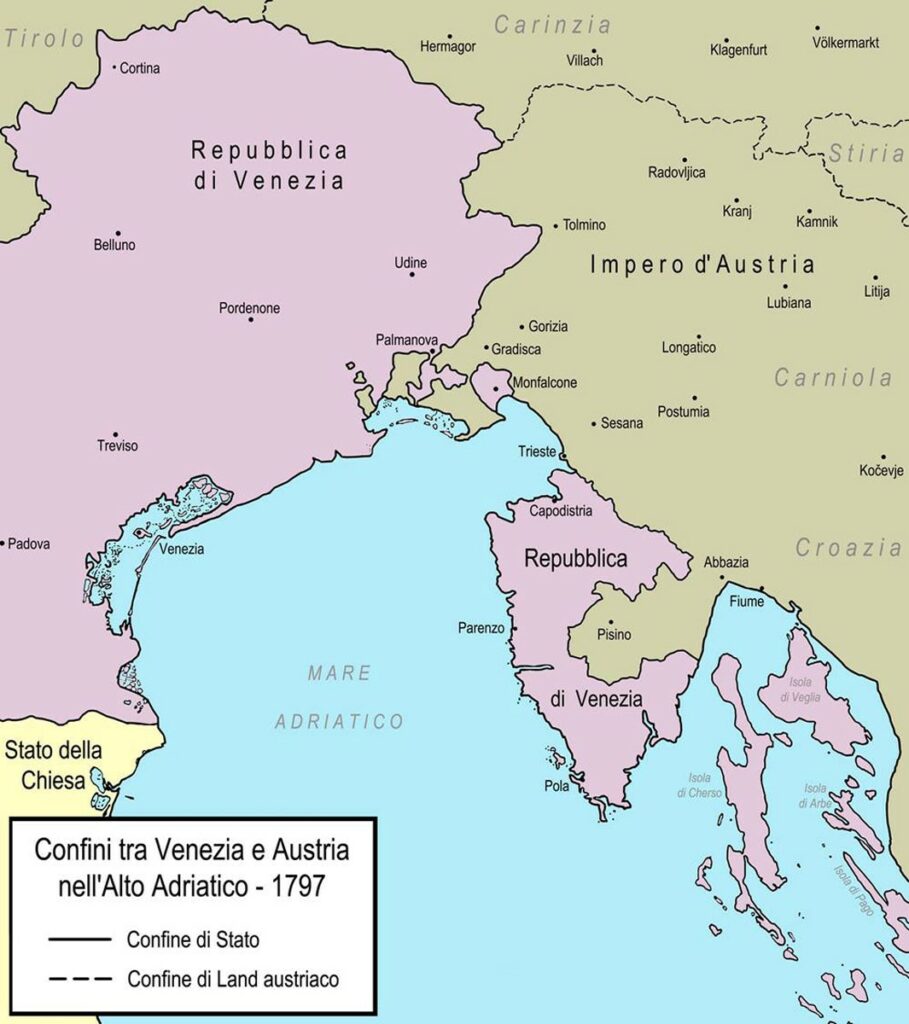
The Borders of the Venetian Republic up to the Napoleonic Wars[10]
Q – What should be the borders of the Venetian Republic?
A – We claim the borders of the Venetian Republic before the Franco-Austrian occupation in 1797 and well described in the Treaty of Campoformio: “The Venetian Republic where it was and how it was!”
Q – What do you mean by ‘we are not secessionists, but resistanceists’? Do you mean that the Venetian Republic is not interested in secession from Italy, but only in making the Veneto people aware of their identity? If so, how can you say that you want the Venetian Republic with the borders of centuries ago?
A – I want to say that we are not pursuing a project to ‘detach’ ourselves from Italy, creating a new state. Instead, we are citizens of an illegitimately occupied state, we are the Venetian Republic, a state unduly occupied by bullying and force, against our rights as a historical and sovereign people. We are therefore resisters to a foreign occupation, fighters in the interest of a historical nation, occupied against the law.
Q – So not being fought by force this occupation will continue. Is wanting the borders of the Serenissima just a figure of speech?
A – We contest the ‘rights’ of occupation of the Venetian nation affirmed and shared in the Treaty of Campoformio of 1797 by the French and Habsburg occupiers. The Savoy simply obtained in 1866 with the Treaty of Vienna an ‘endorsement’, like a bill of exchange, of an abusive title, an anti-Venetian title! No Venetian authority ever countersigned the anti-Venetian treaties of Campoformio and Vienna. The Savoy did not free the Venetian territories from Habsburg occupation, but simply appropriated them. Everything else is banditry, fraud laced with Italianistic rhetoric. The Veneto people still have republican DNA and we are the proof. By contesting the imposture of Campoformio we recognise the violations of our borders in 1797 and later as illegitimate. The Venetian Republic for us remains territorially the same as it was in 1797: we do not want to create a new state, we want to liberate the occupied Venetian state. That is why we elected the CXXI Doge, as a sign of legal and political continuity of the Venetian Republic: illegitimately occupied, but not suppressed.
Q – But how do you want to liberate the illegitimately occupied state of Veneto? By demanding the abrogation of those treaties because they are illegitimate? But by now they will never be abrogated. In any case, it is impossible to return even to the borders beyond the Adriatic, because they are territories of other states yet.
A – We lay down the principle of respect for our territorial integrity. France and Austria (heir this to the Habsburgs as Italy is to the Savoy) are called to account for their abuse in the international courts of justice when our national authority is recognised by the international mafia. For now, we assert our titles, which we could not do previously. Titles of justice and freedom are never time-barred. Our political problem is to awaken the Veneto people from the indormia [anaesthesia: ed. We are like General De Gaulle, who moved to London in 1940 to organise resistance to the German occupation in the name of free France. We, likewise…
France and Austria will have to recognise and compensate for the damage caused by their occupation of a neutral republic. Gaddafi when he came to Italy wore on his chest the pictures of Libyan martyrs killed by the Italian occupier. And he forced the Italian republic to pay reparations for the damage done to the Libyans by the Kingdom of Italy. Berlusconi could tell Gaddafi that these were the faults of an outdated regime that had disappeared. But Gaddafi was able to force the Italian Republic to pay for the damage caused by the Kingdom of Italy.
We gain our strength by asserting our legitimacy on a daily basis – which we do incessantly – and by awakening the Veneto people ‘narcotized’ by the propaganda and censorship of the occupying regime. The ‘road sheets’ we suffer and the Italian censorship are the tools used to try to annihilate us.

Venetian riots of 1848: Daniele Manin and Nicolò Tommaseo carried in triumph by the crowd that freed them[11]
D – A demonstration of the Veneto people for peace and freedom has been called for Sunday 24 January next year in Treviso, starting at 3pm from the area in front of the railway station. The official slogan is ‘Veneto people marching for peace and freedom’. How many people do you think will come?
A – For many adverse reasons, if we manage to be 200 at the Treviso March, we will consider it a great political success!
Q – The watchwords of the event are not few:
History, Values, Self-determination, Right, Decolonisation, Independence, Language, Freedom. Can you briefly summarise what you want to achieve under each of these headings?
A – The purpose of the march is to keep alive the question of independence, to remind the Venetians that our goal is to liberate the Venetian Republic so that it can contribute to the formation of a new Europe, free from US colonialism, free from the plague of war; to the formation of a Europe that is not shattered, but cohesive and inclusive, according to the ideas that were also Charles De Gaulle’s and Michail Gorbachev’s. The brilliant and peaceful history of Venice allows us to support this perspective, the perspective of a better Europe, in a better World.
Q – Do you want Veneto to be taught in schools? But the Veneto of the Verona area is different from the Veneto of the Venice area, in one area for example to say money you say ‘schei’, a hard sound, in the other you say ‘sghei’, a softer sound.
A – The Veneto Nation must take care of and enhance its extremely rich cultural and linguistic heritage. We do not need to invent a Veneto language, because it is simply that of our literature, of the books that circulated among all cultured people before the foreign occupations. Schools and universities will therefore not have to invent anything, but simply restore life and oxygen to our linguistic and cultural heritage.
ITA038
[1] https://www.ansa.it/sito/notizie/cronaca/2016/10/22/venetisti-eleggono-albert-gardin-doge_40f23f9c-257a-4379-86aa-1289c9f47c4f.html
[2] https://www.ilgazzettino.it/nordest/venezia/scontro_tra_veneti_ducale_conteso_doge_gardin_attacca_regione-2412182.html
[3] https://www.oggitreviso.it/manifestazione-non-autorizzata-daspo-al-doge-au24457-300710
[4] https://nuovavenezia.gelocal.it/venezia/cronaca/2023/04/17/news/venezia_manifestazione_50_anni_legge_speciale_chi_c_era-12758934/
[5] https://www.storicang.it/a/caduta-della-repubblica-di-venezia_14794
[6] https://www.serenissima.news
[7] https://www.repubblicaveneta.net
[8] https://www.sololibri.net/Dell-Iliade-Omero-tradotta-in-veneziano-Casanova.html
[9] https://www.youtube.com/watch?v=cY5Iw8wkBYw
[10] https://confinepiulungo.it/1-da-venezia-all-austria/
[11] https://it.m.wikipedia.org/wiki/File:Daniele_Manin_Repubblica_di_Venezia.jpg

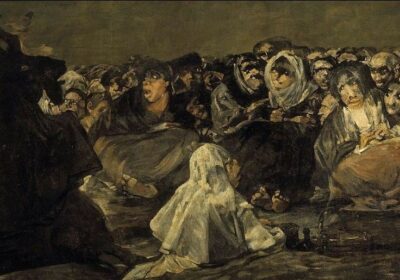
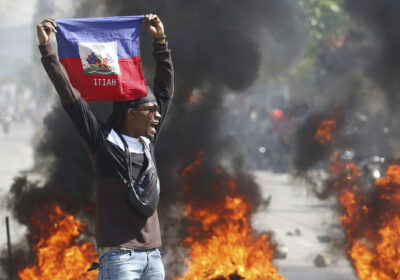
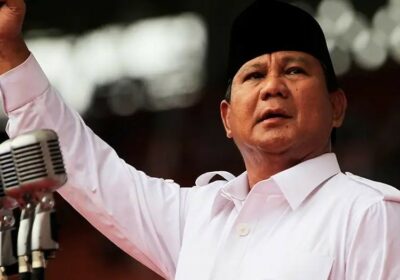
Leave a Reply